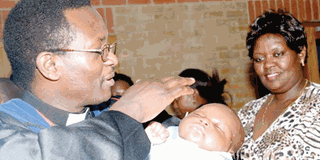Understanding the seven Catholic sacraments

Baptism is the first sacrament that initiates one into the Catholic family and before it, one is not considered a Christian in the Catholic Church.
There are four sacraments in the Anglican Church - baptism, confirmation, Holy Communion and marriage and two in most Pentecostal churches - baptism and Holy Communion. In the Catholic Church there seven and these are; baptism, penance, the Eucharist, confirmation, Holy Communion, ordination and holy matrimony.
A sacrament is an outside sign of an inner transformation or change, according to the book Westminster Confession of Faith. And according to the Catholic Encyclopedia, sacraments are outward signs of inward grace, instituted by Christ for our sanctification. “The Roman Catholic Church teaches that while God gives grace to man without outward symbols (sacraments), He has also chosen to give grace to man through visible symbols. Because God has done this, man is foolish not to make use of this God-provided means of gaining sanctification,” goes a quote from the encyclopedia.
Why is there a contradiction in the number of sacraments a church should have and what do the seven Catholic sacraments signify? Rev Fr Joseph Nkera is a priest at St Charles Lwanga Catholic Parish Kibiri. He says sacraments are instituted by Christ for the spiritual nourishment of believers and explains each one of them as below.
Baptism
This is the first sacrament that initiates one into the Catholic family. You are baptised in the name of the Father, Son and Holy Spirit. The priest is mandated to administer this sacrament but any lay man can do it in his absence during critical times like on a deathbed for those who have never been baptised. Before baptism, one is not considered a Christian in the Catholic Church, which believes that baptism enables one to share the benefits of the Holy Spirit.
Confirmation
This sacrament confirms you into the faith and opens up doors for you to enjoy the other Catholic sacraments like the Eucharist and matrimony among others. Other benefits enjoyed include visitation from priests and other church members.
Eucharist
By faith, believers in the Catholic Church feast on the body and blood of Jesus Christ and thereby become one in him. Here, the bread and wine are believed to turn into the real body and blood of Jesus Christ.
Penance
This is the forgiveness of sins by the Father. Catholic priests are the medium to God for the forgiveness of sins. However, you can be forgiven by God directly without going through this medium and priests encourage it very much. “People should learn to talk to God directly, although we get the chance to counsel them when they come for penance at our offices, a thing which doesn’t happen when they pray alone,” says Rev Fr Nkera.
Before appearing to the father for penance, you should be well prepared to:
Tell the whole truth about the sin.
Have self-repentance.
Confess everything to the priest.
Accept counselling from the priest.
Holy matrimony
This is the joining together of two people (man and woman) to form a family. When two people make the sacrament of matrimony, the attendees of the function are just witnesses.
Here, the married parties are expected to join each other in soul, body and mind. This means that your mind should be free from all forms of deceit, for example, one is expected to declare any children outside wedlock and any form of illness suffered, among other things. When anything concealed is later discovered, the marriage is nullified. Marriage can also be nullified when a partner has an affair, or when someone is impotent.
Anointing of the sick
This theory is taken from the book of James, where church elders were often called upon to anoint the sick in their midst.
Ordination of holy orders
This is the ordination of priests and fathers. Women however, can’t be ordained in the Catholic Church but can s




